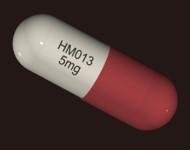Fruquintinib Disease Interactions
There are 5 disease interactions with fruquintinib.
Fruquintinib (applies to fruquintinib) bleeding
Moderate Potential Hazard, Moderate plausibility. Applicable conditions: Bleeding Associated with Coagulation Defect
Fruquintinib increases the risk of hemorrhagic events which may lead to fatal outcomes. Closely monitor patients who are at risk for bleeding.
Fruquintinib (applies to fruquintinib) hepatic impairment
Moderate Potential Hazard, Moderate plausibility. Applicable conditions: Liver Disease
Fruquintinib has not been evaluated in patients with moderate hepatic impairment (total bilirubin greater than 1.5 times and less than 3 times ULN and any AST) and it is not recommended for treatment in patients with severe hepatic impairment (total bilirubin greater than 3 times ULN and any AST).
Fruquintinib (applies to fruquintinib) hypertension
Moderate Potential Hazard, Moderate plausibility.
Hypertension was reported in patients taking fruquintinib. Fruquintinib should not be initiated in patients unless blood pressure is adequately controlled.
Fruquintinib (applies to fruquintinib) infection
Moderate Potential Hazard, Moderate plausibility. Applicable conditions: Infection - Bacterial/Fungal/Protozoal/Viral
Infection was reported in patients taking fruquintinib. Fruquintinib should not be initiated in patients with active infections. Closely monitor for infection during treatment and withhold treatment during active infection.
Fruquintinib (applies to fruquintinib) thromboembolic events
Moderate Potential Hazard, Moderate plausibility. Applicable conditions: History - Thrombotic/Thromboembolic Disorder
Fruquintinib may increase the risks for arterial thromboembolic events. Initiation of fruquintinib in patients with a recent history of thromboembolic events should be carefully considered.
Switch to professional interaction data
Fruquintinib drug interactions
There are 240 drug interactions with fruquintinib.
Fruquintinib alcohol/food interactions
There is 1 alcohol/food interaction with fruquintinib.
More about fruquintinib
- fruquintinib consumer information
- Check interactions
- Compare alternatives
- Side effects
- Dosage information
- During pregnancy
- Drug class: multikinase inhibitors
- Breastfeeding
- En español
Related treatment guides
Drug Interaction Classification
| Highly clinically significant. Avoid combinations; the risk of the interaction outweighs the benefit. | |
| Moderately clinically significant. Usually avoid combinations; use it only under special circumstances. | |
| Minimally clinically significant. Minimize risk; assess risk and consider an alternative drug, take steps to circumvent the interaction risk and/or institute a monitoring plan. | |
| No interaction information available. |
See also:
Further information
Always consult your healthcare provider to ensure the information displayed on this page applies to your personal circumstances.


